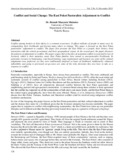| dc.description.abstract | Conflict among herders
in East Africa
is a common occurrence. It affects millions
of
people
in many ways by
extinguishing their live
lihoods and forcing many others
to change.
This paper
is focused on the East Pokot
pastoralists
’
adjustment
to
conflict. The paper
first presents
the East Pokot
as a people, their history, brief
interaction with the central government, and their geographical region.
In the second part, the paper discusses
the patterns of adjustment to conflict. The paper argues that in the face of sustained conflict occa
sioned by
loss of
livestock
,
whic
h is their mainstay, many East
P
okot families have turned to non
-
pastoralist livelihoods. In
particular recourse to beekeeping, crop based farming
,
wage employment
and
business are some of the cultural
adaptations now preferred, yet
they were traditionally despise
d
as bases of livelihood. Additionally
,
enhanced
inflexibility and going to previously no
-
go
-
zones are some of the risky decisions they now have to take as a
response to conflic | en_US |

